|
Chrysotoxum cautum? --> Chrysotoxum cf. verralli
|
|
| HTK |
Posted on 27-06-2022 22:03
|
|
Member Location: Posts: 226 Joined: 16.05.13 |
Wasp-like syrphid visiting bindweed flowers on a sunny margin at the base of the renatured old mining dump at Landweiler-Reden (Saarland, Germany) on 18 June 2022. Size about 13 to 15 mm. Obviously one of the Chrysotoxum species, which are rather difficult to separate. I would suggest Chrysotoxum cautum (relative length of the antennal segments, shape and amount of yellow markings on the abdomen). Can this be confirmed? I have slightly rephrased the question, added another picture and am looking forward to your opinion. Image 1 Edited by HTK on 07-07-2022 20:04 |
|
|
|
| HTK |
Posted on 27-06-2022 22:03
|
|
Member Location: Posts: 226 Joined: 16.05.13 |
Image 2 |
|
|
|
| HTK |
Posted on 27-06-2022 22:04
|
|
Member Location: Posts: 226 Joined: 16.05.13 |
Image 3 |
|
|
|
| HTK |
Posted on 27-06-2022 22:04
|
|
Member Location: Posts: 226 Joined: 16.05.13 |
Image 4 |
|
|
|
| HTK |
Posted on 01-07-2022 19:26
|
|
Member Location: Posts: 226 Joined: 16.05.13 |
Image 5 |
|
|
|
| treebeard |
Posted on 05-07-2022 12:57
|
|
Member Location: Posts: 601 Joined: 13.08.13 |
Pictures are not large enough to measure antenna segments (in Ch. cautum the 3rd segment should be as large as other two segments together - it does not seem to be the case of your picture), however, my impression is Chrysotoxum verralli (yellow strips on tergites are triangular). Ch. cautum's abdomen has a different pattern. Best regards, Matej (not an expert) |
|
|
|
| HTK |
Posted on 07-07-2022 20:01
|
|
Member Location: Posts: 226 Joined: 16.05.13 |
Hello Matej, thank you very much for your helpful comments. It's certainly no coincidence that Ball and Morris speak of the "difficult five" with the two species under discussion among them. Kind regards, Hans Theo Edited by HTK on 07-07-2022 20:02 |
|
|
|
| HTK |
Posted on 11-07-2022 13:24
|
|
Member Location: Posts: 226 Joined: 16.05.13 |
Hallo Matej, this is to let you know that Ximo Mengual, who is a syrphid expert, in the meantime had a closer look at the pictures and confirms your view. He definitely excludes Chrysotoxum cautum. His comments: - C. cautum has the scutellum yellow, with a transparent marking in the center; your specimen has a clear black marking on scutellum. - C. cautum has the basoflagellomere (postpedicel) almost equal in length as scape and pedicel together; your specimen has the postpedicel shorter than pedicel+scape. Ximo also thinks that the photographed specimen looks very much like Chrysotoxum verralli. Best wishes, Hans Theo Edited by HTK on 11-07-2022 13:25 |
|
|
|
| Jump to Forum: |


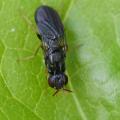



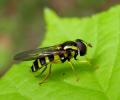
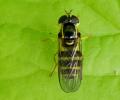

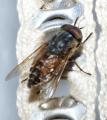
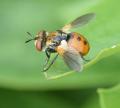


 but don't see the image in the post.
but don't see the image in the post.
